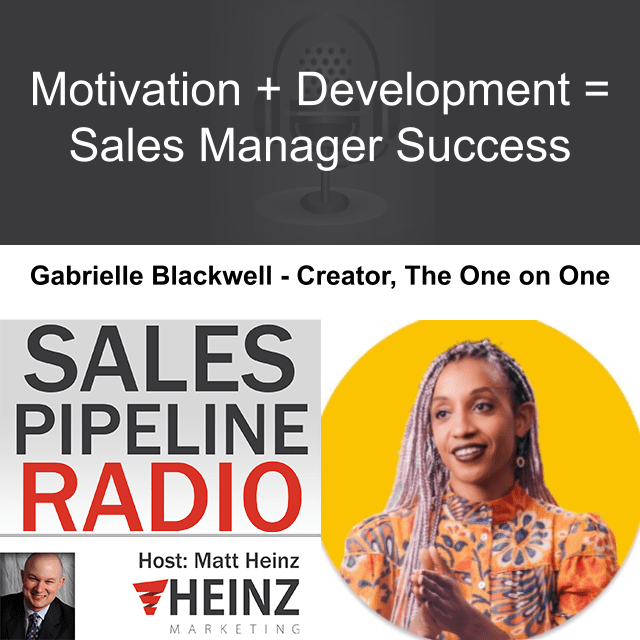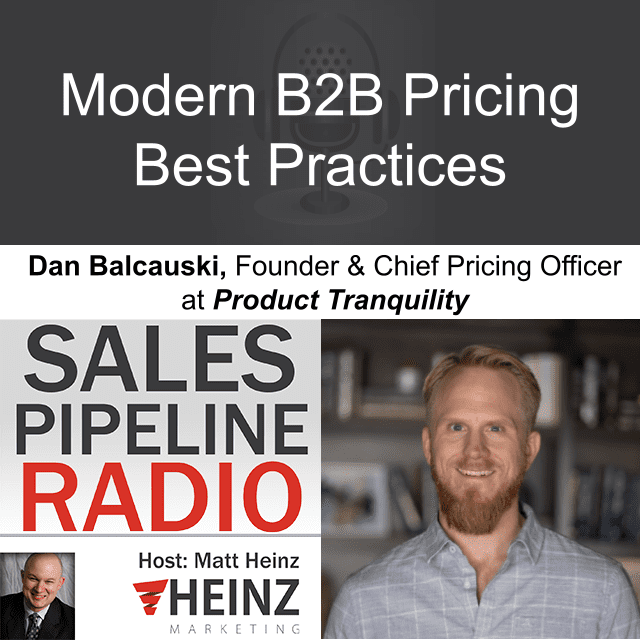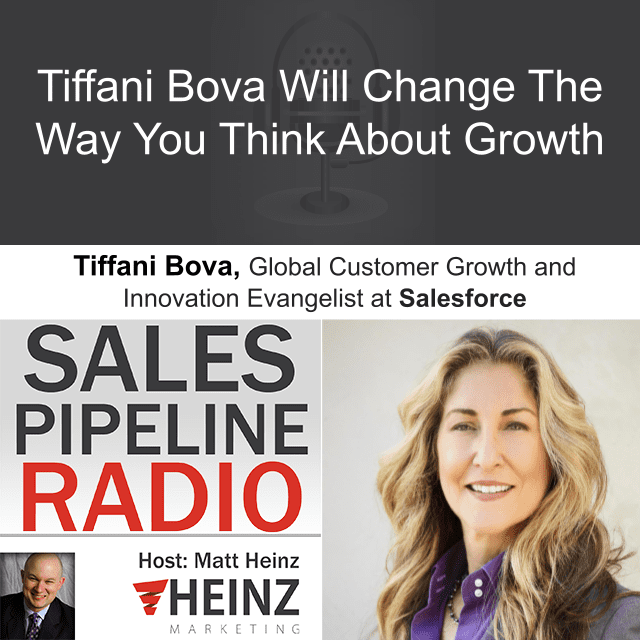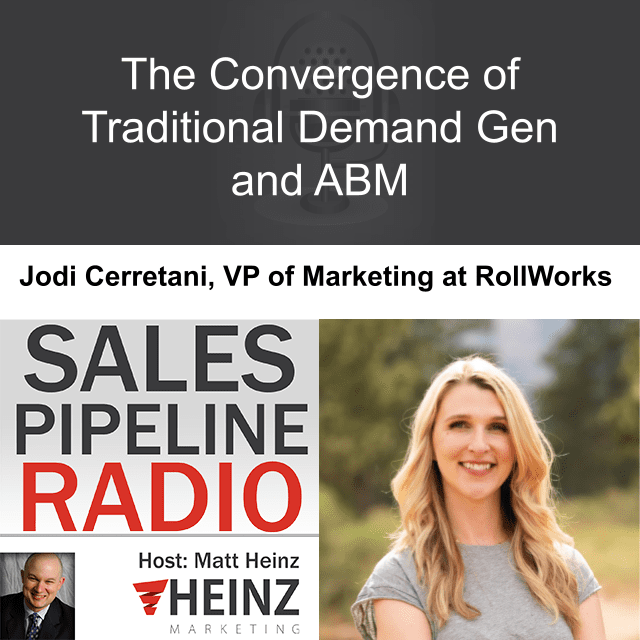Sales Pipeline Radio, Episode 343: Q & A with Gabrielle Blackwell

By Matt Heinz, President of Heinz Marketing
If you’re not already subscribed to Sales Pipeline Radio or listening live every Thursday at 11:30 am Pacific on LinkedIn (also on demand) you can find the transcription and recording here on the blog every Monday morning. The show is less than 30 minutes, fast-paced and full of actionable advice, best practices and more for B2B sales and marketing professionals.
We cover a wide range of topics, with a focus on sales development and inside sales priorities. You can subscribe right at Sales Pipeline Radio and/or listen to full recordings of past shows everywhere you listen to podcasts! Spotify, iTunes, Blubrry, Google Play, iHeartRADIO, Stitcher and now on Amazon music. You can even ask Siri, Alexa and Google or search on Audible!
This week’s show is entitled, “Motivation + Development = Sales Manager Success” and my guest is Gabrielle Blackwell (aka GB) Creator of The One on One.
Tune in to learn to:
- Discover why understanding someone’s track record of motivation is crucial to their goals and performance
- Learn how being a leader who genuinely cares and fosters safe spaces for employees to share their challenges can enhance productivity and engagement
- Discover how empathy can flourish in virtual settings, allowing managers to guide, mentor, and support employees even in times of global uncertainty.
Watch the video, listen in below and/or read the transcript below.
Matt: Alrighty. Well, welcome everybody to another episode of Sales Pipeline Radio. I’m your host, Matt Heinz. So thankful that you all are here joining us for another episode. If you are joining us live as part of your workday, if you’re joining us live on LinkedIn or on YouTube, thanks very much for joining us. If you are listening or watching this on demand, thank you very much for downloading, for subscribing, for listening. If you like what you hear today, this is what we do. We feature some of the best and brightest minds in B2B sales and marketing on a regular basis.
And you can find all past and present and future episodes of this podcast on salespipelineradio.com. Super excited to have today, the author of The One on One newsletter. She also is the co-host of the BDR coffee talk program that is co-hosted with 6Sense. Just an all-around bad ass, Gabrielle Blackwell, better known to her friends as “GB” joining us today. Thanks so much.
Gabrielle: Yeah. Thanks, Matt. I’m so excited to be here.
Matt: I have been able to watch and admire you from afar from the work you have done with the newsletter. You do a lot of video work. You’re active on social, with the BDR coffee talk group you do with 6Sense. Give people a little highlight of your background and where you focus.
Gabrielle: It’s funny because I followed you for a while in the background. I started off as an SDR in 2015 and I was working at this company where we sold a content marketing solution for companies that were translating into different languages and, I was like, okay, Heinz marketing, might’ve been in my territory. So, I was like, I need to know who Matt Heinz is. I need to know where he’s going. So, I was a little stalker girl for a little while and ended up being really good at it. So much so that when I moved to another company, they had promoted me up to an SDR manager and I have just not left since 2017.
So, during that time I’ve worked at companies that were 50 people companies that grew to 100. I’ve worked at companies like Gong and Airtable that went from 400 to 1000, now working at Culture Amp as an SDR manager. So, I’ve seen it all done it all. There’s not much that surprises me anymore. And then I get to of course have like The One on One content brand and the coffee talk.
Matt: Definitely encourage you if you are a sales manager, sales leader, definitely check it out.
So much ground we could cover just in terms of sales leadership, sales management. I want to talk a little bit about being a sales manager versus being a coach. But I think one of the topics that we were talking about before is this idea of motivation.
What motivation looks like for modern sellers versus different generations. Really important distinction to make. So, talk about what motivation means to you for a sales organization. Then we’ll kind of unpack different flavors of that.
Gabrielle: When I think about motivation or the things that compel people into action, the more we can understand someone’s motivation, the more we have our hands on the steering wheel, that’s kind of the analogy that I give with my folks, even trying to understand a prospect’s motivation and what compels them into action.
Motivation is going to be different from one person to the next. That’s the most important thing that we need to understand as managers and leaders. And one of the things I really like to understand is, what is the track record of motivation for this person? Because if someone says, “I’m motivated by money.”
And I say, okay, “cool”. Tell me about a time where you had the opportunity to make more money and you changed how you operate–you made a different decision. You may have left a place, whatever. And if they don’t have a track record of it, at least three examples, I question whether this is a true motivation. So I always just kind of start off with understanding…
Give me some examples, some stories that illustrate what really drives you. And let’s start from there. And then also, I want to understand, who are leaders that you’ve worked for or teachers that you’ve learned from or coaches, from a sports perspective, that really kept you motivated and driven in these arenas. And how do they show up? What were the main behaviors?
And then this then gives me kind of a playbook, right to be able to operate with them. I think another thing that’s really important is recognizing that motivations change over time, depending on what’s going on in someone’s life.
At one point in time, someone might’ve been motivated by “I want to make more money”, but then they might have kids, they have a family, something changes in their family and they say, “actually what I really care about a lot more is flexibility and independence”. I think just being very, very attuned to the fact that people are complex and they change over time.
Matt: How much is motivation impacted by a company’s culture or a sales team’s culture? Your first answer there is very much– motivation is an individual, personal thing. Is it mostly personal or is it driven also by sort of team dynamics as well?
Gabrielle: I think your environment has so much influence over how you show up, right?
If you are in a relationship with someone and they pour into you and then you’re like, “All right, cool. I’m getting a lot from this relationship”. You’re going to keep on going back to the well. If you’re in a relationship with someone, they take and take and take from you and you’re like, “Oh, wow, all of a sudden I feel like” it’s not to say that I’m not motivated. It’s just that “I actually am running on empty”.
If you’re in an environment that is not aligned to your values and what it takes for you to thrive in an environment, it makes a lot of sense why you’re just surviving here.
I think as well as a manager, one of the things that we need to be really mindful of and that’s why I suggest asking that question about who are the leaders or teachers or coaches or whomever else it is. How do they show up for you that influenced you or inspired you to show up more and perform better and stay motivated and productive? Because if we’re not meeting people’s needs on that side, then it would make a lot of sense why all of a sudden we start to see some disengagement from them.
Matt: Is it harder to try to drive and impact that motivation in a virtual environment? I don’t know how much time you’ve spent in a sales floor with people in person versus doing it virtual. Any changes to how you drive motivation and can impact motivation in a primarily virtual environment?
Gabrielle: I think I’m nearing towards majority of my management experience is happening in a virtual or hybrid world. But the first two and a half years of managing was all in an office. I would say that it’s been easier in a virtual setting. And I think some of this is because people are at home. They’re a little bit more comfortable. We’re not face-to-face. And for whatever reason, it’s like we’re able to connect a little bit more deeply than we would if we were in an office and people have to get ready, get dressed, show up, put on and have a façade there.
I think if managers are willing to build up that level of professionally safe intimacy with their people in a remote setting, you’d start to see that you’re actually getting to know your people much deeper and much more than you would if you were in an office.
In this weird world where like literally, the world’s burning right now. There’s a lot of things that are happening. And so in these settings, too, I find that people are willing to have those conversations with me about “I’m struggling. I’m trying to figure out how does work actually fit into all of this while it seems like everything is burning to hell?”.
I think there’s an opportunity for people to be more than managers and really be like, mentors and guides, especially for folks who are earlier on in their career.
Matt: I think that’s a pretty big difference. And I want to double click on that a little bit around how earlier generations came to work and the conversations that happened at work that today, whether we ask them to or not, people are bringing their whole selves to the office.
And it may be in-person or virtual and, you know, the things that they are thinking about, worried about in life impact work. Where are the lines on that? In terms of especially from a sales management standpoint, I mean, if something’s going on in someone’s life or in the headlines, you can’t help, but that impact, how do you address all of that holistically with someone where the objective from a management standpoint is obviously production?
You need an output as an employer from a sales rep, but you still have to address the real human behind them as well. That feels like a very complicated mix.
Gabrielle: Yeah. There’s a book somewhere in my home about sales coaching and it talked about The Performance Formula.
So it was like performance equals some set of variables and some of the variables were like, you need order, you need a little bit of chaos, right? You need to have direction as well, but then one of the big variables that showed up that has the biggest impact is your relationship. The relationship between the manager and their person, right?
If you do not have a relationship with your people, then that is always going to impact productivity and performance. They’re not mutually exclusive.
I will go to work and I will run through a wall for a manager who I think actually cares about me and gives a damn about me and will go there and have those conversations with me versus someone who I think is just having a transactional engagement with me.
I think the most important thing is, whatever’s going on in the world, you still have to be the leader. You still have to be that person who instills a level of confidence and who inspires a certain sort of fearlessness, even if the world is crumbling and it’s really hard to sell.
I always recommend whatever’s going on, trying to come at it from a lessons learned perspective and giving people or inspiring people the vision to keep hold of while everything might be really tough.
But I also think it’s knowing your boundaries too. I’m a people leader, but I also am somebody who’s not a licensed therapist.
And there are certain situations where I have to say, “Hey Matt, I can help in these areas, but I think something that’s gonna maximize what we’re doing here is finding somebody who can help you in these ways”
Especially if you have any kind of employee assistance programming through, like, Modern Health or BetterUp or whatever, but I say “I recommend you talking to our therapist and our coaches” to my team like every single week and I see people benefiting from that and bringing that back into the team settings too.
Matt: I think sometimes just empathy, right? To your point, you’re not expected to be a counselor and solve these problems, but to recognize that they’re there.
And empathy is not solving the problem. It’s sitting there with them and saying ” I see you and this, I know this is hard.” And just that alone can be so powerful for someone even in a professional environment, it feels like that they are heard and supported.
Gabrielle: Yeah. In majority of engagement surveys that I’ve seen, one of the number one questions that I see is ” do you feel like your manager cares about you?”. If that’s one of the first questions it is probably one of the biggest predictors of someone’s level of engagement and therefore potential for performance.
The ability to just to sit there and be present with someone and say “obviously this is really hard for you. And that’s normal.”
Matt: Talking today on Sales Pipeline Radio with Gabrielle Blackwell, “GB” to her friends, who is a sales manager and also the author of The One on One, a fantastic sales newsletter.
Go to workweek.com, if you scroll down you will see a headshot of her that looks like it is Scotch taped next to her name, you can click on that and subscribe to her newsletter. Highly recommend it.
So I was reading, a few past issues and one of the things you talk about is this idea of how you show up as a leader. We can talk about the conversations we want to have. We can talk about the depth and detail of what that is, but what does it mean to show up as a leader and how do you have to be prepared to do that well?
Gabrielle: Good question. The words that are popping up for me: We have to be prepared to meet the moment whatever that is. And so there are times where for me, let’s say it’s in a one-on-one setting and my rep is sharing or venting or whatever and I’m like, “what’s going on?” What am I doing? Sometimes it’s just taking a moment and asking a question—what is the best way I can meet the moment for my rep right now?
And asking the questions, “Hey, what’s the best way that I can show up for you? Do you just need me to listen? Would it be helpful if we just soundboarded this? Or do you need to tell me what to do?
What is the best way that I can show up for you?
So, in a one-on-one setting, it can be like that. And there’s sometimes where I see my team in a group setting, we’re going to a place that is very unproductive and I have to be the person who goes, “hey, we are hitting an out of bounds line right now. I hear you. I understand but also we are moving towards here.
So again, how do we need to show up? How does each person need to show up in this situation to help get us there? It’s one part asking. It’s like being a coach, asking questions to your people to help you figure out what’s the best way to show up for your folks.
But it’s also making sure you’re challenging your folks to show up better if they’re not doing what they need to do or they’re not showing up in a way that’s gonna be productive for them. That to me is really what I think about when I say show up as the leader.
Matt: That’s a two-way street. When you do effective one-on-ones, both people are coming with their best selves, both people are coming fully present for the moment. Both people are coming prepared for the conversation they want to have.
When you think about preparation for those one on ones, what should a sales rep bring to that conversation?
What should a manager or sales coach bring to that conversation?
Gabrielle: I do two, one-on-ones with my team per week. One is focused on a numbers review, but it’s more so focusing on what do you need to accomplish this week to set yourself up for success for the quarter.
And then what’s gonna help you? And what’s gonna be a hindrance? And then depending on what’s gonna help or what’s gonna hinder, that becomes our focus for our coaching conversation on the second one-on-one of the week.
First one-on-one that we have, the most important thing is, we need to understand what’s going on in your business. You need to have command over that. So we have a pacing formula that helps us understand what can we predict in terms of performance. What are the main things that are influencing those numbers? What’s going really well. And then also what are your goals need to be this week? And then coming in prepared with, here’s like my step by step of how I’m going to accomplish my goal.
If I understand my rep’s numbers and I’m coming in prepared with that and my rep is coming in prepared with, here’s my goals for the week and here’s how I’m going to accomplish it we can spend a lot more time coaching on what is your strategy for execution. And you’re going to be way ahead versus, showing up to a one on one on a Tuesday and spending 20 minutes just filling out a spreadsheet. You are missing out on 30 minutes of coaching every single week compared to the person who’s coming in prepared.
Matt: That’s right. Awesome. Well, one of the things you wrote on LinkedIn, for those of you aren’t following GB on LinkedIn, definitely check out her content there as well. It’s one of the things you talked about the beginning and end of a one on one.
In the beginning, just like ask, “how are you?”
And sometimes you have to ask that question twice, right? “How are you?”
And people say, “I’m fine”. No, no, no, no. How are you? Right. I mean, literally give that space and oxygen to have that conversation because if you don’t, it’s there anyway, and it’s gonna color what they’re willing to share in the conversation as you go.
So your advice is start with “how are you” in close with “I appreciate you”.
Gabrielle: Yes.
Matt: We talk a little bit about appreciation and that gesture, which is just three words, but how important that is for people to be seen whether they’re hitting their number or not.
Gabrielle: Yeah, I think that’s the most important piece is that when we’re in a performance-based role, sometimes we only wait until somebody hits their number to actually say, “Hey, you’re doing a great job”. But there’s so many things that happened before that. And so if people are only associating their worth or their level of appreciation with their performance, you’re probably in a toxic culture.
Like, that’s my honest belief versus someone where it’s like, “all right, I need to inspire you. I need you to believe”, right? I’m going to encourage you because that’s going to be the things that are going to help you perform over time.
So just reminding people whether you’re performing or not, I believe in you and I appreciate you, I appreciate your presence.
It’s important. You’re important.
Matt: It is super important. Hey, last question before we have to wrap up. Like I said, definitely check out her newsletter, The One on One, check out her content on LinkedIn. You’re a prolific creator.
Who are some of the creators that you listen to? Who are some of the people, sales leaders and otherwise that continue to teach and inspire you?
Gabrielle: Some of the early folks for me were Kevin Dorsey. He’s been a mentor of mine has been highly influential as well. And give a shout out to Scott Leese to all Austin folks where I’m in Austin, Texas. I’ve just, I’ve appreciated his level of vulnerability, but also challenging people. Ralph Barsi is another mentor of mine.
Honestly, they’re just so many mentors like Nate Vogel. But I think there was people like Nikki Ivy and Sarah Brasier when I was first started creating. I think one of the most beautiful things is to see somebody that you really admire and respect and scroll back three, four years and see where they started, right?
It’s so helpful to know that everybody starts from the same place and you just notice they’re just really consistent. I’m going to give a shout out to, I think that was like five or six people.
Matt: And I love that they were just right on top of your head, right? I mean, people that you’re thinking about the people; we are all learning from each other. And I think that that continual learning process– – nobody has all the answers since we’re all just kind of figuring this out and growing in real time.
Well, GB, thank you so much for joining us today. Thanks for being part of Sales Pipeline Radio.
Gabrielle: Thank you, Matt. Appreciate you.
Thank you everyone so much for joining us. We’ll be back next week, every week, 11:30 Pacific, 2:30 Eastern on Thursdays. This has been another episode of Sales Pipeline Radio we’ll see you next week. Take care.
Listen to the Latest Episodes:
Matt interviews the best and brightest minds in sales and Marketing. If you would like to be a guest on Sales Pipeline Radio send an email to Sheena@heinzmarketing.com.




